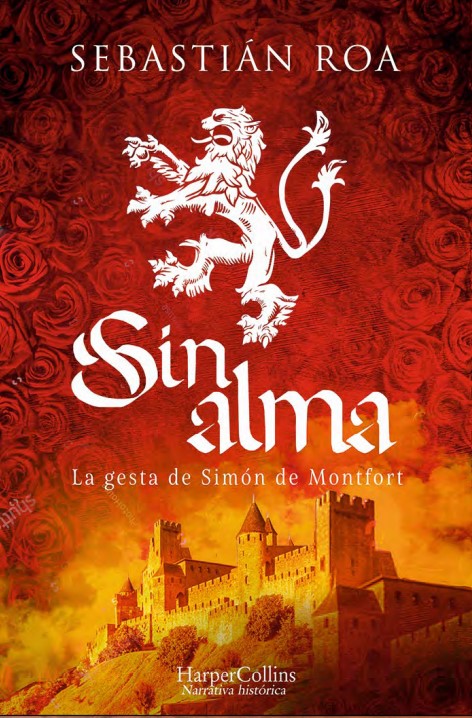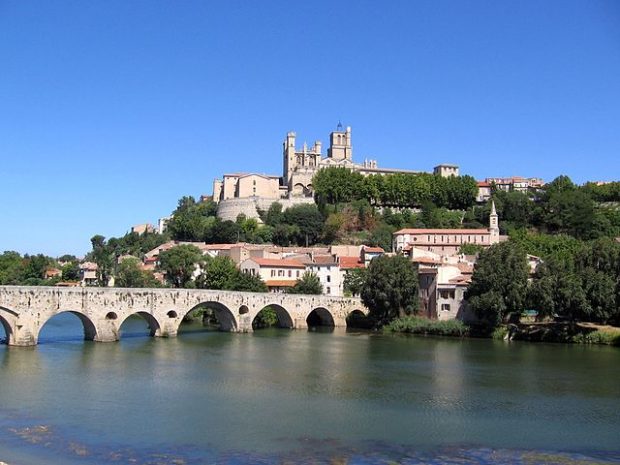Current view of Béziers PHOTO: Omnidom 999~commonswiki
Sebastián Roa returns to bookstores and that, in this house called 20th centuries, is cause for happiness. Santiago Posteguillo says that this Aragonese writer is the best historical novel writer of the 21st century, and I don’t know if he’s the best, but I’m sure he’s among them. Now, after a vacation from two novels in ancient Greece, he returns to the Middle Ages that established him. And he does it with a story about the crusade against the Cathars or Albigensians. Its titled Without soul (HarperCollins Ibérica) and its protagonist is the always pointed and vilified Simón de Monfort.
I remember that fifteen or twenty years ago there was a saturation of Cathars and Templars in general literature and in historical literature in particular. For many fans of the genre, as was my case, and despite having enjoyed, for example, the cycle of children of the grail by Peter Berling, a book on Cathars or Templars was pointed out to them and they waved their hands as if swatting away flies. Perhaps, the saturation did not come so much from the theme, but from the approach, always similar, pushed perhaps by the undoubted success of the thriller esoteric Dan Brown style, after The Da Vinci Code. Spirituality new agea story of whites and blacks, of good and bad, etc.. they always occurred in those works.
With the soul of a dynamite (or perhaps more properly, of a heretic) Roa arrives and plants us a novel about that crusade where the word Cathars is not said, where they are hardly seen (heretics, what heretics? where are they? repeat several characters in the novel) and narrated from the point of view of one of the commanders of that crusade, Simón de Montfort. And it turns out that far from distorted beliefs, from passages reinvented by nationalism or from a story of saints and monsters, that story, in their hands, changes. And a lot.
This novel of characters that begins with a brutal episode in Syria worthy of those movies about Vietnam -I think, for example, of The hunter– soon stands as one of the darkest works of its author. There are in its pages a spiritual and psychological density, a political tension, that lulls and weaves into a powerful and emotional plot, full of battles and betrayals. Simón de Montfort is not that great villain of history that appeared in some popular books a long time ago, but an authentic and realistic medieval knight, with his problems and his behavior. A man of war and faith, with all that that implies.
Roa draws a crusade full of political and economic interests, where religion is in the background, where it is impossible to find good bad guys and where changing sides is the norm. Where the most important thing is the construction of propaganda stories that are created. Furthermore, far from idealizing medieval warfare, the novelist recounts a brutal campaign of terror reminiscent of some insurgent wars we have seen in recent times.
And in that tempestuous setting, Roa places a protagonist who is not a monster, but a traumatized man with the firm intention of redemption, of doing what is fair and honest, who is pushed to horror by events. In addition, he knows how to surround him with a gallery of characters full of nuances that contribute: Alix, his wife; Azalaís, the lover and enemy; the venerable and terrible Arnaldo; King Pedro of Aragon; the count of Toulouse; el Rojo… The first two women, especially, shine in a special way and seem to claim even more space in the novel.

Roa molds time, places and historical characters to reconstruct them in a narrative, free and naturally narrative way. A staunch defender of a historical novel that is primarily literary and far from mere fictionalized chronicles, Roa puts another notch in his ideology with this, paradoxically and probably also in the author’s opinion, the most canonical historical fiction. of the. He still he manages to erect a radical work, which challenges previous visions about the Cathars and that crusade (attentive, without going any further, to the famous “kill them all, that God will already distinguish his own” of Béziers), and unfolds, with the difficulty that it implies, a true character novel about it.
Few current authors manage to offer us trips through time that are so palpable, that go deep, that provoke questions and reflections.
With all those ingredients and with the electric style, deep or forceful when he owes it, to which the author has already accustomed us throughout nine novels, Roa triumphs again with a novel that is undoubtedly among the best of the year. I won’t tell you more, find out; they will appreciate it.
you can follow me on Facebook, Twitter Y goodreads.
If you have been interested in this entry, you may like…
The soul of Simon de Montfort: novelizing the Cathar crusade like never before

